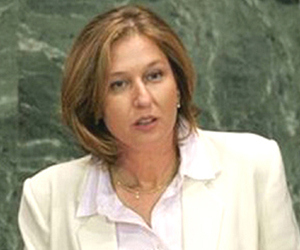Tzipi Livni's meteoric rise from obscurity
 Tel Aviv - Ten years ago Tzipi Livni was a novice legislator, entering parliament for the first time. Now, three general elections later, she finds herself within grasping distance of the prime minister's chair at the centre of the horseshoe-shaped cabinet table in the centre of the Knesset.
Tel Aviv - Ten years ago Tzipi Livni was a novice legislator, entering parliament for the first time. Now, three general elections later, she finds herself within grasping distance of the prime minister's chair at the centre of the horseshoe-shaped cabinet table in the centre of the Knesset.
By Israeli standards, it has been a meteoric rise. While her two main opponents in Tuesday's election, Benjamin Netanyahu and Ehud
Barak, have also enjoyed similar fast-tracks to the top, the former entered politics after several high-profile public service jobs, while the latter "parachuted" into politics (to use the Israeli term) directly from a distinguished military career.
Livni's rise to the top is in no small part due to a shift in her ideological thinking, which has seen her abandon the hawkish, hardline ideology of the Likud Party, in favour of the political centre.
In an interview with The New York Times in June, she said she was raised on two key values, which she later found contradictory - "that the whole (Biblical) land of Israel was our heritage," and "the need to respect others, not to control others' lives."
"I reached my own conclusion, that there is a need to divide the land," she said. "I still believe in our right to the whole land, but felt it was more important to make a compromise."
Livni was one of the first to follow former premier Ariel Sharon when he broke away from the Likud to form the Kadima party in late 2005.
When Sharon was felled by a massive hemorrhagic stroke several weeks before the March 2006 elections, she was briefly touted as a possible replacement at the head of the centrist party, but when Ehud Olmert was chosen, she was quick to declare her support for him.
Her reward was the foreign ministry, and when Israel renewed negotiations with the Palestinians at the end of 2007, she was appointed head of the Israeli negotiating team, even though her relations with Olmert had by then soured dramatically.
She won the leadership of Kadima after Olmert, besieged by investigations into his alleged corruption, quit the party leadership, and she won by emphasizing that she represented a new, cleaner style of politics, in contrast to her unpopular predecessor.
This was to have been the fulcrum of her election campaign, but events, in the form of Israel's three-week-long offensive in the Gaza Strip, intervened.
The offensive was a boon to Netanyahu, who had for months been demanding that Israel take tough measures against Hamas and other militant groups in the enclave.
The offensive, launched after repeated rocket barrages on Israel from the salient, was popular among the Israeli public, and Livni, mindful of losing votes to Netanyahu, who for months had been advocating a harsh Israeli response to the rockets, began adopting an increasingly belligerent tone.
She has thus urged a harsh response to continued rocket attacks from Gaza, and even spoke of a new offensive in the enclave if necessary.
But at the same time, she has been careful not to alienate the more moderate among her supporters, letting it be known, for example, that she had been in favour of an early end to the offensive in the Strip.
These seemingly contradictory attitudes provide ammunition to her detractors, who say is a sphinx, liked by many not because they know who she is, but because they do not know.
Other critics also say she at times appears cold and shows no emotion, while supporters stress her integrity, authenticity and her analytical and decision-making abilities.
She prefers to call herself a pragmatist.
Livni was born in Tel Aviv on July 5, 1958. Her roots are in the "aristocracy" of Israeli right wing politics. Both her parents were in the pre-State armed group Irgun. Her father Eitan served as the group's operations officer and, after being captured by the British mandate authorities, led a daring breakout from Acre jail in 1947. He served three terms in parliament after Israel was founded in 1948.
Livni graduated in law at Bar Ilan University, near Tel Aviv, served as a lieutenant in the Israeli army and was an agent in the Mossad intelligence organization.
Her public life began when she was appointed Director General of the Government Companies Authority, placed in charge privatizing government companies and monopolies.
She entered parliament in 1999, on behalf of the Likud, and quickly caught the eye of then-Likud leader Ariel Sharon. When Sharon was elected premier in 2001, Livni found herself in the cabinet, holding a succession of portfolios, culminating in her appointment as foreign minister.
Livni, who plays the drums for relaxation , says she prefers jeans to a suit and sneakers to high heels, has been a vegetarian since age 12. She is married to a Tel Aviv attorney, and is the mother of two sons. (dpa)